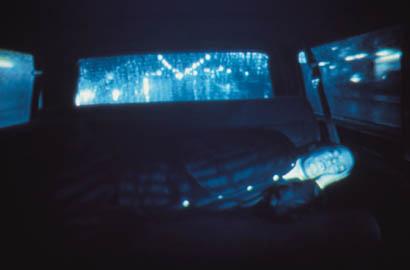Rodney Graham
dal 23/9/2002 al 17/11/2002
Segnalato da
23/9/2002
Rodney Graham
Whitechapel, London
Drawing from such diverse sources as Lewis Carroll, Kurt Cobain and Ian Fleming, this exhibition is the most comprehensive presentation of the artist's work to date. Inspired by his interest in cyclical narratives, Sigmund Freud and the unconscious, the works in the exhibition are loosely grouped into five sections and trace a psychological journey beginning with sleep and entry into a dream-like world.

Vancouver-based artist Rodney Graham has been creating
photographs, installations, music, book works and film since the
late 1970s. From his famous upside-down photographs of trees
to his award-winning film at the 1997 Venice Biennale, he is
recognised as one of the most original artists of his generation.
Drawing from such diverse sources as Lewis Carroll, Kurt Cobain
and Ian Fleming, this exhibition is the most comprehensive
presentation of the artist's work to date. Inspired by his interest in
cyclical narratives, Sigmund Freud and the unconscious, the
works in the exhibition are loosely grouped into five sections and
trace a psychological journey beginning with sleep and entry into
a dream-like world.
The first section, Parallel Reality, in the Lower Gallery introduces
Graham's early explorations into the relation between perception
and reality. The artist's ongoing fascination with optical principles
is reflected in his models of a camera obscura and inverted
photographs of trees.
The second section, The Recurring Dream, includes the artist's
celebrated film trilogy. These cinematic costume dramas show
the artist as a variety of fantastical characters locked in cycles,
including a marooned sailor on a wind-blown Pacific island, a
lonesome cowboy repeatedly setting off into the sunset and a
19th century Parisian dandy perpetually accosting his country self.
The films are looped, paralleling the recurrence of repressed
traumatic memories.
Between the Lines in the Upper Gallery then focuses on
Graham's interest in language through his book works, texts and
literary appropriations. Often prompted by a coincidence or
irregularity in a text, Graham frequently digresses to reach
illogical and sometimes absurd conclusions.
In Performance, the fourth section, Graham explores music
practice and instruction, taking Richard Wagner, his assistant
Engelbert Humperdinck, Sigmund Freud and Kurt Cobain as his
subjects. By infiltrating artists' practices he comments on values
of authorship and originality.
The final section, Bliss, plays with different states of reality
through film, photography and sculpture. If these attempts at
altering perceptions of reality fall somewhat short of an idyllic
experience, then 'Halcion Sleep' shows the artist in seventh
heaven and finally sedated to sleep once again.
The exhibition is supported by The Department of Foreign
Affairs and International Trade of Canada, The Canadian High
Commission, London, Donald Young Gallery, Chicago and the
Lisson Gallery, London. The Whitechapel gratefully
acknowledges the co-operation of the Art Gallery of York
University, Ontario.
This exhibition is co-produced by the Whitechapel Art Gallery,
K21 Kunstsammlung im Ständehaus, Düsseldorf and Ville de
Marseille/mac, galeries contemporaines des Musées de
Marseille.
Image: Halcion Sleep, 1994 26 minute video, variable dimensions, Vancouver Art Gallery Acquisition Fund VAG 98.2 a
Whitechapel
80-82 Whitechapel High Street E1 7QX
London



